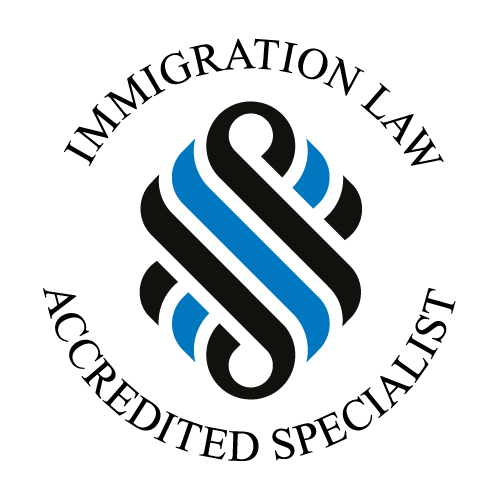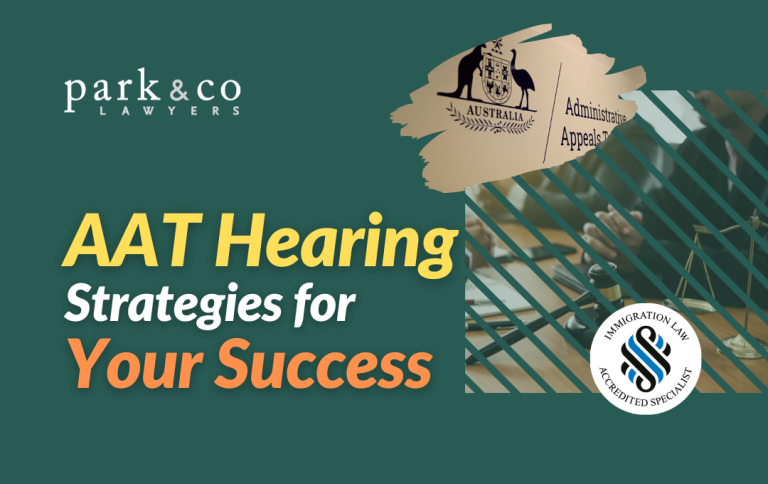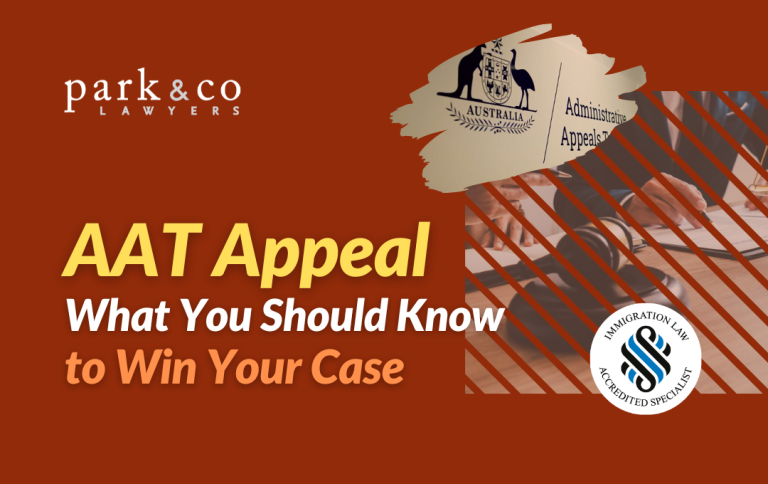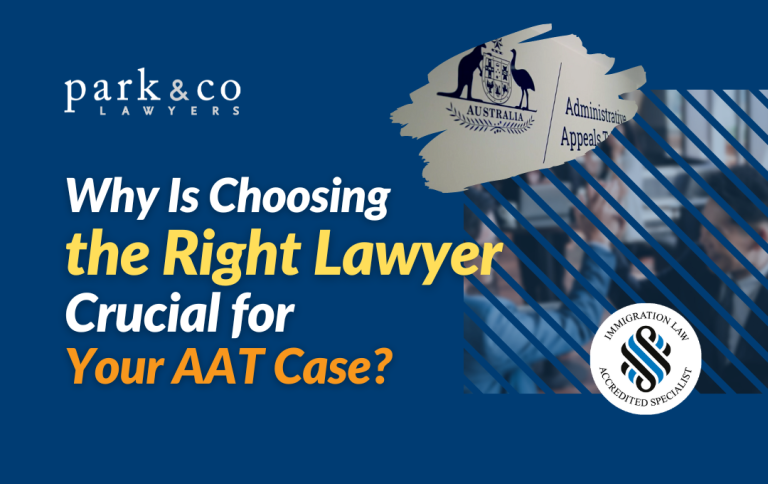Your Visa
Refused or Cancelled?
We help you find the best solution!
Our team of immigration lawyers will quickly analyse your visa situation and advise you on the best course of action, free of charge. If your agent doesn’t seem to be responding properly or quickly enough, get an obligation-free second opinion from our experts today!

Our Accredited Specialist in Immigration Law, Chang Park, will review your case. Our immigration lawyers have helped a great number of people continue their life in Australia.
- Get a fresh perspective if you feel your current agent / lawyer is not pursuing the best arguments or strategy. Your new immigration lawyer from Park & Co Lawyers may spot issues and opportunities the previous one missed.
- Improve your chances of success if you feel your current agent / lawyer lacks sufficient expertise or experience with ART cases specifically. An experienced ART solicitor of Park & Co Lawyers may be more effective.
- Resolve communication problems or lack of responsiveness from your current agent / lawyer. Ensure you have a lawyer who promptly returns calls / emails.
- Avoid unethical conduct like excessive fees, poor preparation, or inadequate attention to your case. All ethical lawyers at Park & Co Lawyers will be diligent and transparent.
- Overcome language or cultural barriers if your current agent / lawyer does not understand your background and needs.
- Benefit from better rapport and trust if you do not have a strong connection with your current lawyer. The lawyer-client relationship is vital at Park & Co Lawyers.
- Gain confidence and reduce stress if you feel your current lawyer does not adequately explain the ART process or prepare you for hearings.
TERMS OF USE AND DISCLAIMER
- Your private and personal information will strictly be kept in confidence
- We will endeavour to provide you with our Case Review™ outcome as soon as practicable, however please be advised that turnaround times will be vary depending on our existing workload and schedule
- Our Case Review™ outcome is not to be taken as formal legal advice, and our response is strictly limited to the instructions and materials that you provide
- Usage of this Case Review™ service does not establish a lawyer-client relationship between yourself and Park & Co Lawyers
- Should you wish to formally engage Park & Co Lawyers for your ART matter, you will be required to sign a retainer outlining the scope of our legal services
- In case where there is an associated matter such as the employer’s nomination refusal, we require those documents as well. You may have to speak to your employer for their authorisation and provision.
- Due to our volume of work, we are not in a position to guarantee a turn-around time on this service.
what makes us different
Why We Are Different
Accredited Specialist in Immigration Law
Our Head of the Immigration Team, Chang Min Park, is an Accredited Specialist in Immigration Law.
Highly Experienced with ART Cases
Park & Co Lawyers has a track record of successful outcomes for various visa types. We understand the procedures, the tribunal’s decision-making patterns, and strategy for effective arguments.
Direct Communication with a Lawyer
We provide clear and prompt communication. We clearly explain ART procedures, timeframes, and hearing preparation. Our lawyers always welcome your questions, and quickly return your calls, emails, and keep you updated on any progress.
Fixed Price
We offer fixed fee services to give our clients clarity. There are no hidden costs, no surprises. Our fees are clearly outlined in our fee table.
Understanding Your Goals
We do our best to understand your situation and find the best solution for you. Our lawyers thoroughly analyse the department’s decision for errors, identify favourable precedents and construct effective legal arguments.
After-Hour Appointments
If you are unable to meet us during our business hours, we will accommodate for you by arranging after-hour appointments.
Accredited Specialist: the Best Weapon for AAT Case
Hiring an Accredited Specialist in Immigration Law is crucial for a successful AAT case. They will provide you with expert knowledge, legal representation, and strategic advocacy, increasing your chances of...
Read MoreAAT Hearing: Strategies for Success
Preparing for an AAT hearing in a migration case requires careful planning, thorough research, and effective presentation of your case. Understanding the process, gathering supporting evidence, and developing strong arguments...
Read MoreAAT Appeals: What You Should Know
An AAT matter requires thorough preparation and a profound understanding of Australian migration law. That's why you should consider retaining an Accredited Specialist in Immigration Law. These professionals, with their...
Read MoreWhy Is Choosing the Right Lawyer Crucial for Your AAT Case?
If your solicitor lacks experience or fails to comprehend the issues specific to your case, it may be advisable to seek a new solicitor. Expertise in Australian immigration law can...
Read MoreWhat Can You Do to Deal with a Visa Refusal?
If the Australian government refuses your visa application, you will receive a letter stating the reasons for this decision, which is called a notification of refusal with a decision record....
Read MorePROCESS

Getting in Touch
We understand that every case is different, and we take the time to listen to your concerns.
Engaging Us
Once you engage with us, we will gather the required details and work on your case.
Getting to Work
We develop a winning strategy that maximises your benefits and give you real-time updates.
Achieving the Best Possible Outcome
Our utmost priority is to deliver exceptional legal services and ensure that your case receives the maximum benefits.
ART Case Review™
What is ART?
The Administrative Review Tribunal (ART) offers a second opportunity for you to state your case. The tribunal member will conduct a comprehensive review of all relevant facts and evidence pertaining to your application, rendering their own decision.
What is the processing time for ART?
The duration for ART to conclude the review process varies and is influenced by several factors, such as:
- The volume of applications received by ART.
- The availability of ART members to conduct reviews.
- The nature of the decision being reviewed.
- The complexity of the review.
For the case of employer nomination refusal, we expect at least 2 years of waiting time and it can be extended up to around 3.5 years.
What is the ART process?
- Lodge Your ART Application within the Timeframe:
- Submit your ART application within the specified timeframe mentioned in your decision letter. (usually 21 days)
- If you miss the timeframe, you do not have any second chance. so make 100% sure you meet the timeframe.
- For onshore applications, an extension of a Bridging Visa is typically granted, allowing stay in Australia during the AAT review process.
- The tribunal may request additional information during this period, and they might make a decision without a hearing if the case can be resolved based on existing information.
- Prepare for ART Hearing:
- Compile an updated set of all supporting documents.
- If represented by an immigration lawyer, they will handle the legal submission on your behalf.
- The legal submission is pivotal as it provides an opportunity to articulate reasons why your visa application should not be refused or cancelled, describe your personal circumstances, and demonstrate how you meet the required visa criteria.
- Attend the Hearing:
- During the hearing, you can:
- Present evidence and arguments.
- Articulate reasons for disagreeing with the decision under review.
- Respond to any questions posed by the Member.
- During the hearing, your representative can :
- Assist the Member, only when they are allowed
- present closing remarks based on the legal submission and the presented evidence
- Typically, the decision is communicated either at the conclusion of the hearing or through written notification at a later date.
- During the hearing, you can:
Why is understanding the ART process important?
Understanding the ART appeal process is crucial following visa refusal or cancellation, as it provides a platform for a merits review, reassessing the fairness and legality of decisions made by the Department of Home Affairs. Various visa decisions fall under the ART’s jurisdiction, and the review process requires submitting an application within strict time limits.
What should I prepare for ART hearing?
Preparing for an ART (Administrative Review Tribunal) hearing is crucial to present your case effectively. Here’s a guide on what you should prepare:
- Up-to-Date Supporting Documents:
- Ensure you have a comprehensive and current set of all supporting documents related to your case. This may include personal documents, letters, contracts, or any evidence relevant to your situation.
- Legal Representation (if applicable):
- If you have legal representation, work closely with your immigration lawyer. They can assist in preparing legal submissions, organising documents, and providing guidance on the proceedings.
- Legal Submissions:
- Prepare a clear and concise legal submission. This document is an opportunity to present the legal arguments supporting your case. Clearly state why your visa application should not be refused or cancelled, elaborate on your personal circumstances, and demonstrate how you meet the required visa criteria.
- Understanding Your Case:
- Have a thorough understanding of the facts of your case. Be prepared to articulate why you disagree with the initial decision and how the circumstances have changed or were misunderstood.
- Witnesses:
- If there are individuals who can provide relevant testimony or support your case, consider bringing them as witnesses. Ensure they understand the details of your case and are willing to testify on your behalf.
- Communication Skills:
- Develop effective communication skills. Be prepared to clearly express your arguments, respond to questions from the Member of the Tribunal, and present your case in a logical and organized manner.
- Anticipate Questions:
- Think about potential questions that may be asked during the hearing and prepare responses. This helps you appear confident and well-prepared. your immigration lawyer can assist the preparation.
- Review Relevant Laws and Policies:
- Familiarize yourself with the relevant immigration laws and policies that apply to your case. Understanding the legal framework can strengthen your arguments.
- Dress Professionally:
- Dress in a manner that reflects the seriousness of the proceedings. A professional appearance can positively influence the perception of the Tribunal.
- Follow Tribunal Procedures:
- Familiarize yourself with the procedures of the Administrative Review Tribunal. Understand how the hearing will be conducted, what to expect, and any specific rules or requirements.
Remember, thorough preparation is key to presenting a strong case at the ART hearing. If you have any uncertainties, seeking advice from legal professionals is advisable.
Do I need to attend to ART Hearing? What if not attended?
While it is not mandatory for you to attend an ART (Administrative Review Tribunal) hearing, it is generally advisable to do so. Your attendance provides an opportunity to present your case directly, answer any questions the tribunal members may have, and offer additional information that could be crucial to the outcome of your appeal.
If you choose not to attend, the tribunal will still review the information and evidence provided in your application and any legal submissions. However, attending the hearing allows you to actively participate in the process and may enhance the tribunal’s understanding of your situation.
If you’re unable to attend for a valid reason, it’s essential to inform the tribunal as soon as possible and provide any necessary supporting documentation or explanations. Keep in mind that the decision will be based on the information available, whether you attend or not.
What would happen in ART hearing?
During an Administrative Review Tribunal (ART) hearing, several key activities and procedures take place. Here’s an overview of what typically happens during an ART hearing:
- Introduction and Preliminary Matters:
- The hearing usually begins with introductions and preliminary matters. The tribunal members, including the presiding Member, may introduce themselves, outline the purpose of the hearing, and explain the procedures that will be followed.
- Presentation of the Case:
- The appellant or their legal representative presents their case. This involves providing an overview of the issues, the reasons for appealing the decision, and any new evidence or arguments that support their case.
- Questioning by the Tribunal:
- Members of the tribunal may ask questions to clarify information, seek additional details, or better understand the appellant’s position. It’s essential for the appellant to respond clearly and concisely.
- Witness Testimony (if applicable):
- If there are witnesses, they may be called to provide testimony. Witnesses can be cross-examined by the tribunal members or the opposing party.
- Legal Submissions:
- The appellant may make legal submissions, presenting legal arguments and addressing relevant laws and policies. This is a critical part of the hearing, as it allows for a detailed examination of the legal aspects of the case.
- Response by the Decision Maker (if present):
- In some cases, the decision maker (the party responsible for the original decision being appealed) may be present to respond to the appellant’s case and provide their perspective.
- Closing Statements:
- Both parties, or their representatives, may have an opportunity for closing statements summarizing their key points and arguments.
- Decision:
- The tribunal may provide a decision at the conclusion of the hearing, or they may choose to reserve their decision and communicate it in writing at a later date.
It’s important to note that the specific procedures can vary, and the above steps are a general guide. The outcome of the ART hearing depends on the evidence presented, the legal arguments made, and the tribunal’s assessment of the case based on relevant laws and policies. If you have legal representation, they can guide you through the process and help you navigate the hearing effectively.
What are the possible outcomes of ART?
The Administrative Review Tribunal (ART) can have various outcomes based on its review of a case. Here are some possible outcomes:
- Affirmation of the Decision:
- The ART may affirm the original decision, stating that they find it valid and reasonable. You lost.
- Setting Aside the Decision:
- The ART has the authority to set aside the original decision, finding it to be incorrect or unjust. This may lead to a reconsideration of the case. You won!
- Remittal for Reconsideration:
- The ART may remit the matter back to the original decision-maker (e.g., the Department of Home Affairs) for reconsideration, with specific directions or guidance. You won and your visa application will be assessed again.
There are other outcomes but it is rare to see them in the migration context.
It’s important to note that the specific outcome depends on the circumstances of each case, the evidence presented, and the legal arguments made during the ART review. Additionally, the ART may provide detailed reasons for its decision, explaining the factors considered in reaching a conclusion. If an appellant disagrees with the ART decision, there may be limited avenues for further appeal, depending on the jurisdiction and the type of decision being reviewed. Seeking legal advice is recommended for individuals navigating the ART process.
What will happen to my immigration status after the decision is made?
The impact on your immigration status after an Administrative Review Tribunal (ART) decision depends on the specific outcome of the review. Here are some possible scenarios:
- Decision in Your Favor:
- If the ART sets aside the original decision or substitutes its own decision in your favor, it may result in a positive impact on your immigration status. This could mean the granting or continuation of a visa.
- Affirmation of the Original Decision:
- If the ART affirms the original decision, your immigration status may remain unchanged, and you would need to adhere to the terms of the original decision. If it was an unfavorable decision, you might need to explore alternative options or avenues.
- Remittal for Reconsideration:
- If the ART remits the matter back to the original decision-maker for reconsideration, your immigration status might remain in a state of uncertainty until a new decision is made.
- Dismissal:
- If the ART dismisses the appeal, your immigration status may be adversely affected, and you might need to explore other options or seek legal advice.
It’s crucial to carefully review the ART decision and any accompanying instructions. If the decision results in a change to your immigration status, you should follow any directives provided by the ART or the relevant immigration authorities. If you have legal representation, consult with them to understand the implications and any further steps that may be necessary.
Keep in mind that the specifics can vary based on the nature of the original decision, the type of visa involved, and the ART’s findings. Seeking advice from immigration professionals or legal experts is advisable to navigate the potential implications on your immigration status.
Why is Choosing the Right Lawyer Crucial for Your ART Case?
Choosing the right solicitor for your ART migration matter is crucial due to its significant impact on the outcome. Warning signs for considering a new solicitor include communication issues, poor performance, suggestions to give up your position, lack of experience, or overcharging. Transitioning to a new solicitor is typically straightforward, involving actions like submitting a notice of representation and obtaining your case file. The process emphasizes addressing common questions and concerns, ensuring a smooth transfer of files. The former solicitor has an obligation to promptly return all case files, and disputes and outstanding invoices should be avoided for a seamless transition. If needed, complaints can be made to regulatory authorities, but prioritizing amicable solutions is advised. Overall, the right lawyer is vital for a successful ART outcome, and understanding the transition process can lead to the best possible resolution for your case.
What would be the strategies for the success of the ART application?
Preparing for an ART hearing in a migration case is crucial for a successful outcome. This involves understanding the ART process, submitting a thorough appeal application, and carefully reviewing the decision made by the Department of Home Affairs. Key steps in the ART hearing process include preparing your appeal case, receiving a hearing invitation, and presenting your case to a Tribunal member. Thorough preparation is essential, involving a strategy based on understanding the case and decision, gathering credible evidence, preparing a clear statement, conducting legal research, and seeking professional assistance from experienced immigration lawyers. Engaging a lawyer can significantly enhance your chances of success by providing guidance, preparing submissions, and ensuring correct procedural steps. Effectively preparing witnesses, if needed, is also emphasized. Overall, by following these steps and seeking professional help, you can navigate the ART hearing with confidence and maximize the chances of a positive outcome in your migration case.
How do Park & Co Lawyers deliver?
The immigration division of Park & Co Lawyers is led by an Accredited Specialist, Mr Chang Min Park.
Engaging an Accredited Specialist in Immigration Law is essential for success in an ART case. These legal teams led by an Accredited Specialist recognized for their expertise through rigorous assessments, offer invaluable benefits such as expert knowledge, legal representation, and strategic advocacy. In the complex realm of immigration law, where ART serves as an impartial reviewer of visa decisions, an Accredited Specialist’s experience becomes crucial.
These specialists, having undergone a demanding qualification process, possess a deep understanding of Australian immigration legislation. While their services may involve initial costs, the long-term advantages outweigh them by avoiding potential legal complications. With less than 100 Accredited Specialists in Immigration Law in Australia, their expertise is highly esteemed in the legal community.
The ART review process offers a significant opportunity to challenge decisions made by the Department of Home Affairs, requiring a careful understanding of procedural fairness and a strong case strategy. An Accredited Specialist brings expert knowledge, legal representation, and strategic advocacy to navigate this process effectively.
Key advantages of retaining an Accredited Specialist include familiarity with precedents, timely resolution of disputes, and access to further review and appeal options if needed. They provide peace of mind, handling the complexities of legal processes and allowing individuals to focus on other aspects of life.
In conclusion, when facing immigration challenges, the assistance of an Accredited Specialist in Immigration Law is crucial for a successful ART case. Their guidance helps navigate the complexities of the ART review process, increasing the likelihood of achieving a fair and just resolution in immigration matters.
How does Park & Co Lawyers charge for immigration cases?
Navigating the Australian immigration system is complex and complicated. There is an inherent risk of misunderstanding or miscomprehending the criteria relevant to certain visa types, or what is required to be provided to the Department of Home Affairs. Accordingly, having your Immigration Lawyer as your trusted advisor with their skills and experience will provide you with the comfort you need.
We are obliged to charge professional fees that are no more than what is fair and reasonable. This takes into account our skill and experience, the scope and complexity of work to be performed, and the time taken to perform that work. Prior to commencing any work, we will disclose and advise you of our estimated fees for your confirmation.
Please click here for our fee table.







